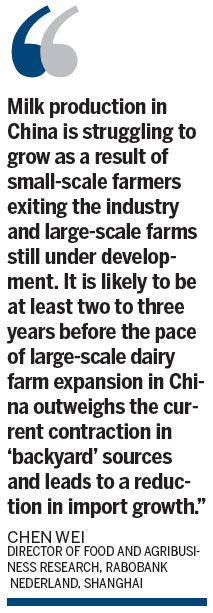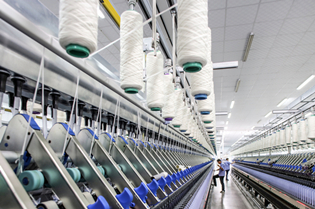Dairy product imports 'to witness sharp rise'
Industry hit by reliance on overseas and inadequate domestic supply
China's imported dairy products will exceed 20 percent growth in 2014 as continued urbanization pushes up demand and a lack of large dairy farms limits supply, a bank report said on Tuesday.
The number of domestic manufacturers will increase to make up 30 percent of the country's raw milk supply in 2016, a rise from less than 20 percent this year, according to a study by Rabobank Nederland.
The current demand-supply gap will gradually be filled by the robust development of bigger dairy pastures, as well as a government-orchestrated industry consolidation that resolved to avoid food safety lapses.
The number of dairy farms in China dropped by 15 percent to 2.2 million from 2008 to 2011, the research found. The proportion of backyard mom-and-pop milking stations was slashed from 70 percent of all farms to fewer than 50 percent in 2013.
The efforts to limit smaller dairy farms stemmed in part from the 2008 melamine scandal that killed at least six babies and sickened thousands more.
The industry is being directed to build larger, vertically integrated farms that house on average herds of 100 cows or more. According to the Dutch bank, these bigger farms boast on average 1.35 times (and up to 1.7 times) the productivity of smaller ones and ensure better quality produce.
"Milk production in China is struggling to grow as a result of small-scale farmers exiting the industry and large-scale farms still under development," said Chen Wei, director of Food and Agribusiness Research at Rabo-bank Nederland in Shanghai. "It is likely to be at least two to three years before the pace of large-scale dairy farm expansion in China outweighs the current contraction in 'backyard' sources and leads to a reduction in import growth."
Building premium dairy houses requires a substantial amount of time and financial input. For instance, the rough cost of a 6,000-head pasture may be as much as 150 million yuan ($24.4 million), leaving aside the additional expenditure in milking facilities and environmental protection measures.
It is also more costly to produce raw milk in China compared with other dairy heavyweight nations, the study noted. The price of corn, an essential grain for cows, is 20 percent higher in China than in the United States. Other key ingredients, such as hay, are 60 to 70 percent more expensive.

China's expanding urbanized population is driving sales of dairy products, which market research firm Frost & Sullivan projects will double from the present $45 billion to $89 billion by 2017.
Despite the breakneck growth, per capita consumption of liquid milk-equivalent is 26 liters per year in China, compared with 78 liters in Japan and 209 liters in the North America Free Trade Agreement region.
China imported 1.52 million tons of dairy products from January to November 2013, up 35.7 percent, according to data from the General Administration of Customs. New Zealand made up the lion's share, at 86 percent, of all imports.
The over-reliance on exports has made China vulnerable to quality loopholes from foreign dairy vendors. The food safety regulatory administrations of China and New Zealand signed an agreement in early November to strengthen cooperation in food safety and quality, three months after elevated levels of nitrates were found in New Zealand milk exports.
To restore customer confidence and fend off foreign competition, the Ministry of Industry and Information Technology said in October it aimed to reduce the number of domestic milk powder manufacturers to 50 from 127.
The government vowed to nurture 10 large-scale dairy entities with an annual income of more than 2 billion yuan to make up in excess of 70 percent of the market in five years.
Inner Mongolia Yili Industrial Group Co Ltd, China Mengniu Dairy Co Ltd and Bright Dairy & Food Co Ltd hold a dominant share of the milk industry as larger operators seize control of the market and scoop up smaller players, according to estimates from Euromonitor International.
A severe shortage of raw milk in China will force companies to step up consolidation along the value chain. In 2013, the supply shortage exceeded 4 million tons compared with 1.7 million tons in 2010, consultancy Fitch Ratings said in November.
A pickup in mergers and acquisitions among dairy companies to tap the growing demand from customers as disposable incomes grow and the government relaxes its one-child policy is also predicted by experts.
Shi Jing contributed to this story.
hewei@chinadaily.com.cn



 Print
Print Mail
Mail





